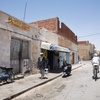Disclaimer
This entry contains information known to us from a variety of sources but may not include all the information currently available. Please be in touch if you notice any inadvertent mistakes in our presentation or have additional knowledge or sources to share. Thank you.
Archive
Synagogue, Qebili (Kebili, ڨبلي), Tunisia
Qebili (قبلي, Qibili, Kebili, קבילי), Tunisia
This site can be found on the corner of Rue Abdallah Ezzoubeir and Rue des Ouvriers - a double-door entrance and fading white-walls mark the former synagogue.
Description
The Synagogue of Qebili
The former synagogue still stands today. However, photographs suggest that present occupants utilize the space for storage. Bags of animal feed and crates of dates can be found along the walls with a walking path in the middle to navigate around the space. Arched doorways and white walls make up the internal architectural structure of the former synagogue. The ceilings appear to be made of a wood-like material—the difference of the wall and ceiling suggests that the upper interior surface of the structure was not originally part of the synagogue but instead that it was a later architectural addition.
Jewish Population
In 1909, the Jewish population count in Kebili, Tunisia was 90. Later, in 1936, this number increased to 325. During these times, Jewish occupations gravitated toward tailoring and monetary lending to local Arabs. [1] While the Jewish community of Kebili was small, they were able to construct spaces for Jewish culture and practice: a synagogue, Talmud Torah, a cemetery, and a mikveh (the location of the cemetery and mikveh are unknown). [1] In 1941, anti-Semitic measures began to be enacted in Morocco and Algeria, however, Tunisia “…was considerably less oppressive.” [2] The peaceful work environment amongst Jews and Arabs in Kebili continued until the rise of Neo-Dustur (the Tunisian nationalist political party) and the post-WWII era which created tensions amongst Arab and Jewish communities. [1] In 1942, amid WWII, the Axiz Power's [Germany/Italy] military occupied the town of Kebili which led to Allied bombings on the town. Jews left Kebili and relocated to border towns where they continued to engage in textile-related occupations. [1] In 1948, the creation of the state of Israel prompted many Jews of the diaspora to migrate there and by 1952, the remaining Jews in Kebili left for Israel.
Sources
Notes
[1] Yad Vashem, “The Encyclopedia of Jewish Life Before and During the Holocaust: K-Sered,” (Jerusalem, 2001), pp. 611. Accessed July, 2018
[2] Michael M. Laskier, “Between Vichy Antisemitism and German Harassment: The Jews of North Africa during the Early 1940s,” (1991), pp.356. Accessed July, 2018
Bibliography
Spector, Shmuel, and Geoffrey Wigoder. 2001. The Encyclopedia of Jewish life before and during the Holocaust. Jerusalem: Yad Vashem. Accessed July, 2018
Laskier, Michael M. "Between Vichy Antisemitism and German Harassment: The Jews of North Africa during the Early 1940s." Modern Judaism 11, no. 3 (1991): 343-69. Accessed July, 2018. http://www.jstor.org/stable/1396112.
Tunisia Trip Summer 2016
Photos Courtesy of Chyrstie Sherman
Write-up prepared by Jessica Ramon July, 2018








